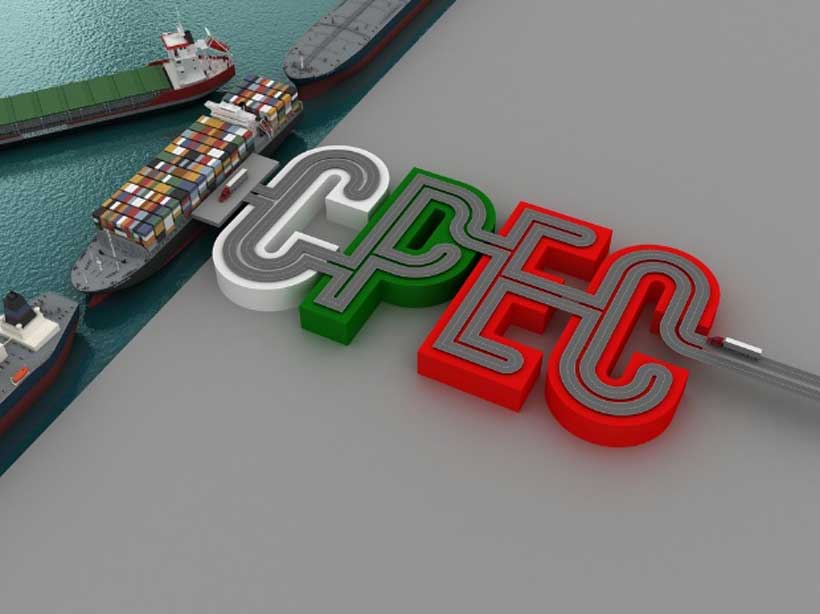China-Pakistan Economic Corridor (CPEC) is one of the most important and imaginative projects commenced by the government of Pakistan in collaboration with the People Republic of China. President Xi Jinping commenced the corridor concept at the inauguration ceremony of historical “Belt and Road” initiative. CPEC project links China and Pakistan through roads, railways, oil and gas pipelines, and fiber optic link. This project is beneficial for Pakistan, in not only developing her infrastructure and minimizing the energy shortage crisis, but it is also of great help in developing the telecom sector of Pakistan through the optical fiber connectivity. It will provide high-speed internet connectivity to the customers in Pakistan. In CPEC project, an 820-kilometer fiber optic cable worth 44$ million will be laid down between China and Pakistan, which will be the 6th high-speed connection to increase the redundancy and to manage the rapidly growing internet traffic transmitting and receiving in Pakistan. Besides roads and highways construction, CPEC project includes up gradation of the 1,300 km Karakoram Highway (KKH), one of the highest international road that connects China and Pakistan.
China has an obvious upper hand in ICT in the globalized world. This sector of China has attracted massive investment and become a backbone in the service sector. The CPEC will provide a digital spider hub for China to access the densely populated region via ICT. In the present times, the countries are largely relying on ICT and most of the developed countries are trying to strengthen this sector in order to sustain their dominance. In the quest for oil and other natural resources, China wants to build connections with Central Asian countries via both physical and technological access. The CPEC project is aimed at providing other countries road and rail access to China via Gwadar port; on the other hand, fiber connectivity gives the virtual access and connectivity among these countries to minimize the impact of other great powers in this region. Hence, it will become a turning point for China to sustain its virtual supremacy in the region. China wants to enhance her strategic importance in the Indian Ocean with its “String of Pearls” strategy. Recently, China added some islands into the Indian Ocean to capture the safe route for ship trading and decrease the influence of India and US in the Indian Ocean.
The digital connectivity along with CPEC provides a brilliant opportunity for Pakistan to improve its information and communication sector. Linking Pakistan with an economic and technologic tycoon China will strengthen Pakistan’s service sector, particularly the technology sector. The fiber connectivity will help the government of Pakistan in improving the poor technological infrastructure and economy of the country. Resultantly, the potential technological “Asian Tiger” will help Pakistan to reduce the impact of Taliban, remove the grievances of Baluchistan and develop good relations with its neighboring countries, especially with India in mutual cooperation in e-businesses. After successful completion of developmental phase and having linked Pakistan with China directly through the fastest digital medium, the information and communication sector will be able to attract foreign investment to strengthen nation’s GDP. Similarly, in reaction to USA-–India strategic bonds, China is interested in empowering Pakistan to approach Gulf and the Middle East. It will improve the sharing of artificial intelligence right between the two countries and it will act like a Virtual Private Network (VPN) between them.
Digital CPEC will reinforce the initiative recently started by Government of Pakistan in the shape of availability of high-speed national broadband backbone, creation of new software centers and localization of triple play services in the country. Furthermore, the impact of the project will enhance the entrance of ICT in leisure, health, retail, security and business activities. Likewise, the other developments, the project contributes to promoting the digital culture in e-government, e-business, and e-commerce. Finally, the fiber connectivity will help in making information technology parks along with the project route, which is supposed to bring an IT revolution in this region. Pakistan has been playing a vital role in the Asian region due to its geographical position and rich potential towards the information technology and its applications. It is supposed that Pakistan will continue to cash its strategic importance in this region. On the other hand, United States, Russia, EU, and China are the most influential powers in the South Asian region.
They also acknowledge the importance of the project and consider it as a game changer for Pakistan. Whereas US interest in this region is gradually decreasing after withdrawal of its troops from Afghanistan in 2014, hence to fulfill this gap and access to the shortest energy routes, China will definitely prove her presence in the region both physically and technologically. As Beijing’s energy needs are increasing day by day, so the Gwadar port in physical connectivity and digital CPEC in technological connectivity are the two important strategic tools to ensure the presence of China in the region in order to serve the interests of China. The digital CPEC will probably ensure Beijing’s cyber connectivity to the regional countries and enhance peace, stability and economic development in the region.
It introduces new horizons of commercial and geopolitical advantages for both the countries and will become a game changer for the entire region. This information corridor will open a new era of technological development in the region. This project will create new job opportunities for the people of the region, as well as attract foreign investment in the information sector in the shape of mobile and landline internet providers. Furthermore, it will strengthen the peace and stability in the region and will be a milestone towards a peaceful and prosperous economy in the region, particularly in Pakistan. A huge responsibility lies on the shoulder of Pakistan to improve law and order situation in the country, stabilize political and economic conditions, as well as ensure a peaceful and secure environment for all stack-holders in order to attract more foreign investment.


